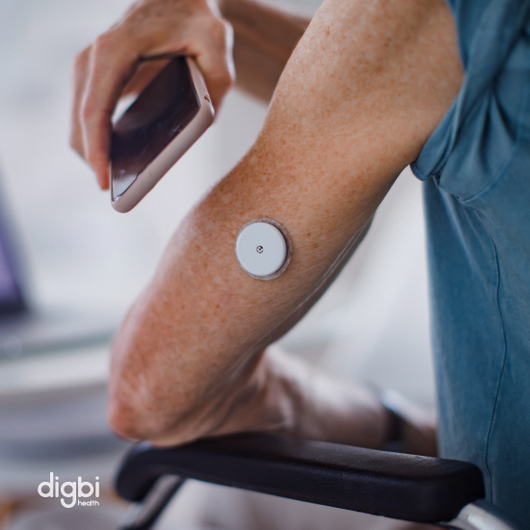Humans of Digbi : Real members on Digbi Health
Skin - Your Body’s Largest Organ
Most people don’t realize that the skin is not just a surface layer, but it is actually the largest organ of the body. It acts as a protective barrier, shielding us from environmental damage, regulating temperature, and preventing water loss. Your skin is constantly renewing itself, working tirelessly to heal wounds, fight off infections, and regenerate new cells. A glowing skin is a sign of health.
The Glucose Glow - Unlocking the Secret to Radiant Skin
In the quest for healthy, "flawless" skin, we often focus on topical treatments and the latest skincare fads. However, the secret to a radiant complexion might lie deeper within our bodies, specifically in the levels of glucose in our bloodstream. While glucose is commonly associated with energy and metabolism, its impact on skin health is profound and often overlooked. Let's explore how managing your glucose levels, understanding your genetics, and nurturing your gut microbiome can lead to a healthier, more vibrant complexion.
The Connection Between Glucose and Skin Health

Glucose, a simple sugar derived from the foods we eat, is crucial for providing energy to our cells. However, when glucose levels spike or become imbalanced, it can lead to a variety of skin issues. Insulin resistance, a condition where the body's cells become less responsive to insulin, can significantly affect your skin. This condition often results from prolonged high glucose levels and can manifest in several skin problems.
Acne and Inflammation
One of the most common skin conditions linked to high glucose levels is acne. When you consume foods high in sugar, your body produces more insulin to help process the glucose. Elevated insulin levels can increase the production of sebum, an oily substance that clogs pores and leads to acne breakouts. Additionally, high glucose levels can cause inflammation throughout the body, including the skin, exacerbating conditions like acne and rosacea.
Glycation and Premature Aging
High glucose levels can also accelerate the aging process through a mechanism known as glycation. This process occurs when excess glucose molecules attach to proteins in the skin, such as collagen and elastin, forming advanced glycation end-products (AGEs). AGEs damage these proteins, making the skin less elastic and more prone to wrinkles and sagging. Maintaining balanced glucose levels can help preserve the integrity of these vital skin proteins, keeping your skin youthful and firm.
Skin Tags
Skin tags are small, benign growths that commonly appear in areas where the skin folds or rubs together. While the exact cause of skin tags is not fully understood, they are often associated with insulin resistance and high blood glucose levels. Managing your glucose levels can reduce the risk of developing skin tags and improve overall skin health.
Dryness and Flakiness
Glucose imbalance can disrupt the skin's natural barrier function, leading to dryness and flakiness. Insulin resistance can impair the skin's ability to retain moisture, resulting in a compromised barrier that allows water to escape and irritants to enter. By managing your glucose levels, you can support your skin's natural hydration and barrier functions, reducing dryness and enhancing its overall texture.

The Role of Genetics in Skin Health
Your genetics play a crucial role in determining how your skin ages, responds to environmental factors, and deals with various conditions. Understanding your genetic predispositions can help tailor your skincare and dietary habits to better support your skin health.
Genetic Insights
- Collagen Breakdown: Discover your genetic predisposition to collagen breakdown and learn how to maintain youthful, firm skin.
- Inflammation: Understand your body's inflammatory responses and how they impact conditions like acne and rosacea.
- Skin Sensitivity: Gain insights into your skin's sensitivity and how to protect it from environmental factors.
- Pigmentation: Learn about your skin's tendency towards hyperpigmentation and effective ways to manage it.
Gut Health and Eczema
Eczema, also known as atopic dermatitis, is a chronic inflammatory skin condition characterized by dry, itchy, and inflamed skin. Emerging research suggests a strong connection between gut health and eczema. An imbalance in gut microbiota, also known as dysbiosis, can lead to increased intestinal permeability, commonly referred to as "leaky gut." This condition allows toxins and bacteria to enter the bloodstream, triggering immune responses that can manifest as eczema.
The Top Three Vitamins and Minerals for Skin Health

Maintaining radiant, healthy skin is not only about what you apply on the outside but also about what you nourish your body with from the inside. Here are the top three vitamins and minerals that have a significant impact on skin health:
Vitamin C
- Collagen Production: Essential for the synthesis of collagen, a protein that helps keep the skin firm and youthful.
- Antioxidant Protection: Protects the skin from damage caused by free radicals, which are unstable molecules that can lead to premature aging.
- Wound Healing: Speeds up the healing process of skin wounds and reduces inflammation.
Vitamin E
- Antioxidant Properties: Protects the skin from oxidative stress and free radical damage, which can cause aging and other skin issues.
- Moisturizing: Helps maintain the skin’s oil balance during the cleansing process and provides deep moisturization.
- Anti-Inflammatory: Reduces inflammation and helps prevent the appearance of fine lines and wrinkles.
Zinc
- Healing and Repair: Crucial for skin repair and wound healing. Helps maintain the integrity of the skin and mucous membranes.
- Anti-Inflammatory: Reduces inflammation and can help with conditions like acne and rosacea.
- Sebum Regulation: Helps regulate the production of oil in the skin, which can prevent acne breakouts.
Next Steps to Radiant Skin
Achieving and maintaining healthy, radiant skin involves understanding and managing your body's internal processes. Here's how you can get started:
- Understand Your Genetics:Invest in a Genetic Skin Report to discover your unique genetic predispositions and receive personalized recommendations.
- Understand Your Glucose:Use a Continuous Glucose Monitor (CGM) to track your glucose levels in real-time and understand how your diet impacts your skin.
- Follow a Personalized Program:Based on your genetic insights and glucose data, follow a tailored 4-week program designed to improve your skin health from the inside out.

By taking these steps, you can unlock the secret to a glowing complexion and enjoy the benefits of healthier, more radiant skin. Ready to transform your skin? Start your journey with Digbi Health today.
ONLY AVAILABLE to DIGBI PROGRAM MEMBERS
Get Instant Insights: Download your Genetic Skin Report through the Digbi App for just $75. Simply open the app and click on Insights Icon at the bottom to buy your skin report.
Manage Glucose for Better Skin ($249). You will get:
- 2 Abbott Libre CGM sensors (last 4 weeks) to track your glucose response and its impact on Skin Health
- Your 12,13,14 NDS rated meals for skin Health
- A Skin Health 4 Week Regimen designed for your Biology










